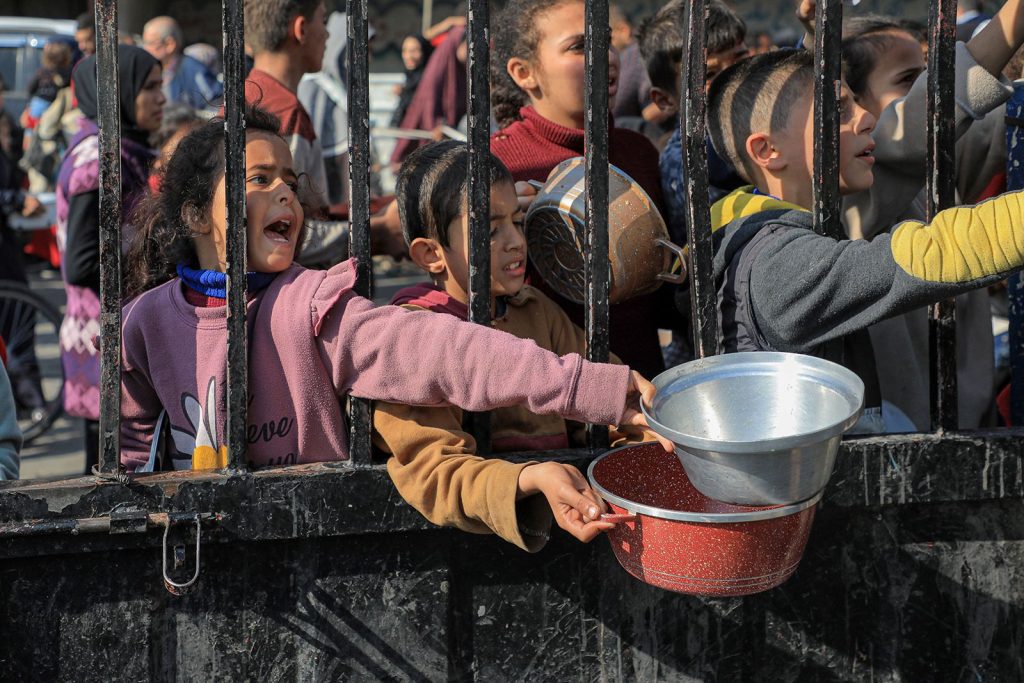By Helen Regan and Chris Lau, CNN
(CNN) — Israel’s war in Gaza has brought famine with “such incredible speed,” the United Nations’ emergency relief chief told CNN on Monday, as he warned that hundreds of thousands of Palestinians are starving in the besieged enclave.
The “great majority” of 400,000 Gazans characterized by UN agencies as at risk of starving “are actually in famine, not just at risk of famine,” Martin Griffiths, the UN Under-Secretary-General for Humanitarian Affairs and Emergency Relief Coordinator told CNN’s Christiane Amanpour.
“It’s been an extraordinary and wholly unwelcome aspect of the Gazan war,” he said. “It has brought famine with such incredible speed to the front of the lines.”
Aid has been trickling into Gaza slowly from two border crossings in the south but agencies have been warning it is a fraction of what is needed.
Last week, the UN Office for the Coordination of Humanitarian Affairs said Israel had denied critical supplies from entering northern Gaza. But Israel has accused the UN’s Palestinian refugee agency of not doing enough and “stalling” the progress.
Griffiths told CNN Monday that work to provide humanitarian aid to 300,000 Gazans who remain in the north of the strip continues to be a challenge.
“It’s not a matter of the number of trucks that can get in,” he said after listing a series of roadblocks stopping aid including unreliable “deconfliction of access routes”, and civilians having to move “from one place of insecurity to another place of insecurity.”
“If you cannot rely on deconfliction of access routes of people in need, if you cannot rely on hospitals not being attacked … if you cannot rely on people having to move from one place of insecurity to another place of insecurity, those are the issues that make humanitarian aid deliveries,” he said. “It’s not a matter of the number of trucks that can get in.”
More than 24,000 people have been killed in Gaza and more than 60,000 others injured since October 7, the Hamas-run Ministry of Health said Monday. Meanwhile, nearly 90% of Gaza’s pre-war population has been displaced, according to the UN.
That campaign began after the October 7 murder and kidnapping rampage by Hamas gunmen that saw some 1,200 people killed in Israel and more than 240 taken hostage, more than 130 of whom are still in captivity, alive or dead.
Israel’s relentless bombing has wrought widespread devastation, as civilians live with the threat of imminent death – either by an airstrike, starvation or disease.
Griffiths warned Monday that the dire humanitarian situation in the enclave could create “generational hatred.”
“We worry for the security of Israel as much as the security of Gaza,” he said.
‘Screaming from hunger’
On Monday, UN agencies issued a joint appeal for greater aid access to Gaza, saying “a fundamental step change in the flow of humanitarian aid into Gaza is urgently needed.”
The heads of the World Food Programme (WFP), UN Children’s Fund (UNICEF) and the World Health Organization said that getting enough supplies into and across Gaza depends on the opening of new entry routes; more trucks being allowed through border checks each day; fewer restrictions on the movement of humanitarian workers; and guarantees of safety for people accessing and distributing aid.
“People in Gaza risk dying of hunger just miles from trucks filled with food,” said WFP head Cindy McCain. “Every hour lost puts countless lives at risk. We can keep famine at bay but only if we can deliver sufficient supplies and have safe access to everyone in need, wherever they are.”
The WFP warned in early December that the “catastrophic hunger crisis” in Gaza which “already threatens to overwhelm the civilian population” will only intensify.
Salwa Tibi, a 53-year-old aid worker and mother of four in Gaza, recently told CNN that her children are “screaming all day from hunger.”
As winds, heavy rains and cooler temperatures descend on Gaza from November to February, aid workers and civilians trying to survive persistent bombardment told CNN they face harsh living conditions, insufficient access to warm clothing, and outbreaks of disease in overcrowded makeshift shelters. Food, fuel and water are ever scarcer, and the price of what little remains is spiraling.
“I felt bad for the kids, they had nothing to keep them warm and we were dying from the cold at night,” Tibi said.
Adults ration their meals so that children do not go hungry. “I see people starving, literally starving,” said Shadi Bleha, a 20-year-old student, displaced from northern Gaza to Rafah, who eats one meal a day.
Lives ‘hanging in the balance’
The Integrated Food Security and Nutrition Phase Classification (IPC) has confirmed that the entire population of Gaza – about 2.2 million people – is facing high levels of acute food insecurity or worse, with one in four households facing catastrophic conditions.
The IPC said it is the highest share of people facing high levels of acute food insecurity the initiative has ever classified for any given area or country.
“Children at high risk of dying from malnutrition and disease desperately need medical treatment, clean water and sanitation services, but the conditions on the ground do not allow us to safely reach children and families in need,” said UNICEF Executive Director Catherine Russell.
Gaza’s 350,000 children under the age of 5 are especially vulnerable, UNICEF said. The agency warned that in the next few weeks, child wasting, which is the most life-threatening form of malnutrition in children, could affect up to 10,000 children.
“Some of the material we desperately need to repair and increase water supply remain restricted from entering Gaza. The lives of children and their families are hanging in the balance. Every minute counts,” Russell said.
But the agencies echoed relief chief Griffiths’ warning that humanitarian aid alone cannot reverse the worsening hunger among Gaza’s population.
Phillipe Lazzarini, Commissioner General for the UN’s Palestine Refugee Agency (UNRWA), said “commercial supplies are a must to allow the markets and private sector to re-open and provide an alternative to food accessibility.”
The-CNN-Wire
™ & © 2024 Cable News Network, Inc., a Warner Bros. Discovery Company. All rights reserved.






More Stories
‘Yuh So Nice’ bringing the Caribbean closer together
Bodybuilders ready for Classic & Pro World Cup
New recruits join Barbados Pathfinder Band